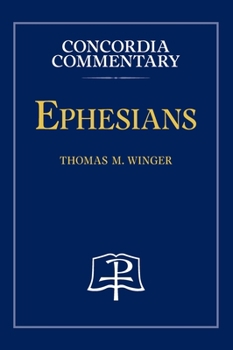Ephesians - Concordia Commentary
"For by grace you have been saved through faith. And this is not your own doing; it is the gift of God," (Ephesians 2:8) Historically, Ephesians was once considered the "Crown of the Pauline epistles," in academic circles, but it has fallen out of favor. Put simply, that is a shame. In this commentary, Dr. Wilch delves in the history, language, and God breathed theology of Ephesians with an original translation. He also notes the prevalence of Ephesians in the Lutheran Confessions, emphasizing Ephesians' relevance from a perspective of a Lutheran heritage. With beautiful rhetoric, the letter to the Ephesians addresses not only the congregation at Ephesus but also the whole church as corporate body.
Features
An extensive history of the Grecian cult of Artemis present in EphesusConsideration of the rhetorical and oral aspects of EphesiansAdditional Essays
The City of Ephesus and Paul's Relationship to itThe Case for Pauline AuthorshipAbout the Series
The Concordia Commentary Series: A Theological Exposition of Sacred Scripture is written to enable pastors and teachers of the Word to proclaim the Gospel with greater insight, clarity, and faithfulness to the divine intent of the Biblical text.
The series will cover all the canonical books of the Old and New Testament, with an original translation and meticulous grammatical analysis of the Hebrew, Aramaic, or Greek of each text. The foremost interpretive lens centers on the unified proclamation of the person and work of Christ across every Scriptural book.
The Commentary fully affirms the divine inspiration, inerrancy, and authority of Scripture; Each passage bears witness to the confession that God has reconciled the world to Himself through the incarnation, ministry, death, resurrection, and ascension of Christ His Son.
Authors expose the rich treasury of language, imagery, and thematic content of the Scripture, while supplementing their work with additional research in archaeology, history, and extrabiblical literature. Throughout, God's Word emanates from authors careful attention and inculcates the ongoing life of the Church in Word, Sacrament, and daily confession.





